Published August, 2020 by in Uncategorized
Deepfakery: A Livestream Talk Series
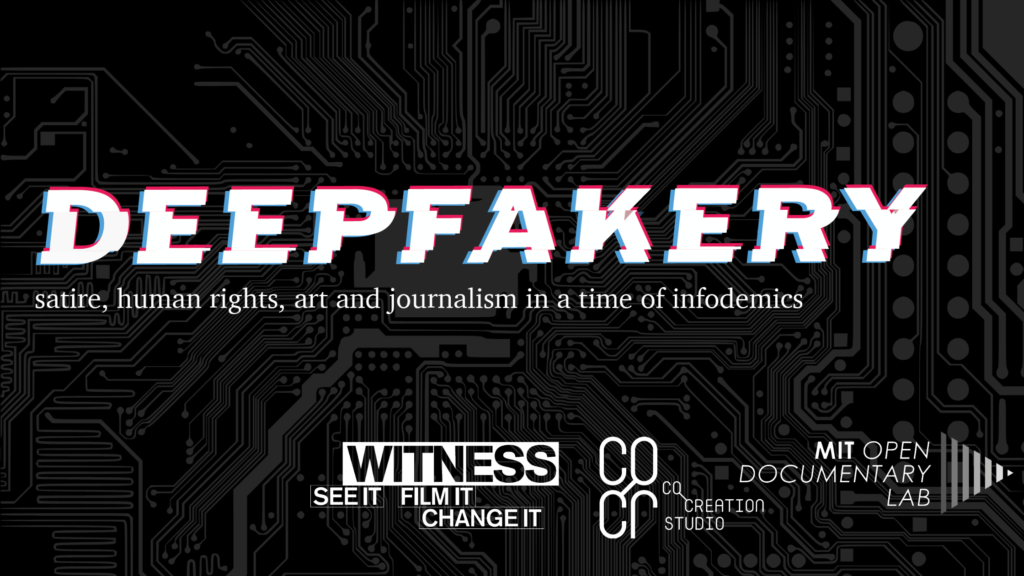
Overview
Deepfakery is a series of critical conversations exploring the intersection of satire, art, human rights, disinformation, and journalism. Join WITNESS and the Co-Creation Studio at MIT Open Documentary Lab for interdisciplinary discussions with leading artists, activists, academics, film-makers and journalists.
Watch the series!
All talks will be livestreamed on YouTube, Facebook and Twitter, including moderated conversation and opportunities for audience Q&A, and recorded versions will be available afterwards on this page.
Learn more about WITNESS’s focus on ‘Don’t Panic, Prepare: Deepfakes’
Thanks to our series supporters:
![]()
![]()
![]()
Schedule
Faking the powerful
Thursday, August 27th, 12:00-12:45 pm EST
Bill Posters and Daniel Howe (Spectre Project) and Stephanie Lepp (Deep Reckonings) in conversation with Sam Gregory (WITNESS)
Not funny anymore: Deepfakes, manipulated media, and mis/disinformation
Thursday, September 3rd, 12:00-12:45 pm EST
Jane Lytvynenko (Buzzfeed News), Karen Hao (MIT Tech Review) and Brandi Collins-Dexter (Color of Change) in conversation with Corin Faife (WITNESS)
Using AI-generated Face Doubles in Documentary: Welcome to Chechnya
Tuesday, September 8th, 12:00-1:30 pm (NOTE: different day of week and longer slot as part of MIT Open Documentary Lab public lecture series
David France (Welcome to Chechnya) in conversation with Kat Cizek (MIT Co-Creation Studio)
Boundary lines? Deepfakes weaponized against journalists and activists
Thursday, September 17th, 12:00-12:45 pm EST
Samantha Cole (Vice) and Nina Schick in conversation with Assia Boundaoui (MIT Co-Creation Studio)
Manipulating memories: Archives, history and deepfakes
Thursday, September 24th, 12:00-12:45 pm EST
Francesca Panetta and Halsey Burgund (In Event of Moon Disaster), James Coupe (Thoughtworks Synthetic Media Resident 2020), Yvonne Ng (WITNESS) in conversation with William Uricchio (MIT)
Still funny?: Satire, deepfakes, and human rights globally
Thursday, October 1st, 12:00-12:45 pm EST
Julie Owono (Internet Sans Frontieres) and Evelyn Aswad (University of Oklahoma) in conversation with Sam Gregory (WITNESS)
Still funny?: Political satire in Brazil with Bruno Sartori
Thursday, October 8st, 12:00-12:45 pm EST
Bruno Sartori (Brazilian political and popular deepfake satirist) in conversation with TBC
Check back here for additional sessions TBC
Session details and panelist bios
Faking the powerful
Thursday, August 27th, 9:00 PST, 12:00 EST, 16:00 UTC
Bill Posters and Daniel Howe (Spectre Project), Stephanie Lepp (Deep Reckonings) in conversation with Sam Gregory (WITNESS)
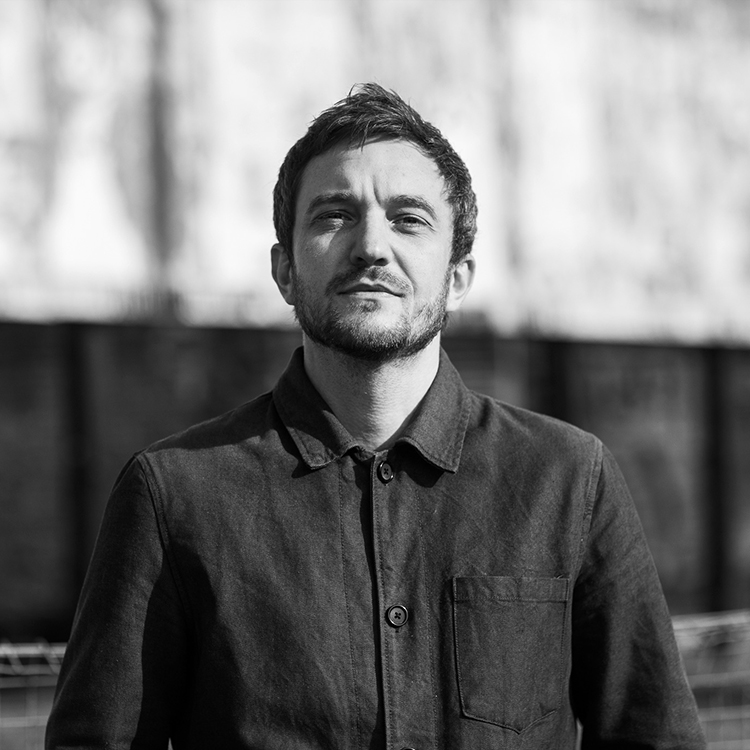 Working under the pseudonym Bill Posters, Barnaby Francis is an artist-researcher, author and activist who is interested in art as research and critical practice. Poster’s works often interrogate persuasion architectures and power relations that exist in public space and online. He works collaboratively across the arts, sciences and advocacy fields on conceptual, intervention, new media, net art and installation-based projects. Recently he has focussed on computational forms of moving image making that include pioneering deep fake and deep video portrait works. His projects have received organic global media coverage in print, on radio and TV. His company, Big Dada Ltd is the only European production company specializing in broadcast quality synthesized media for TV, media and the arts.
Working under the pseudonym Bill Posters, Barnaby Francis is an artist-researcher, author and activist who is interested in art as research and critical practice. Poster’s works often interrogate persuasion architectures and power relations that exist in public space and online. He works collaboratively across the arts, sciences and advocacy fields on conceptual, intervention, new media, net art and installation-based projects. Recently he has focussed on computational forms of moving image making that include pioneering deep fake and deep video portrait works. His projects have received organic global media coverage in print, on radio and TV. His company, Big Dada Ltd is the only European production company specializing in broadcast quality synthesized media for TV, media and the arts.
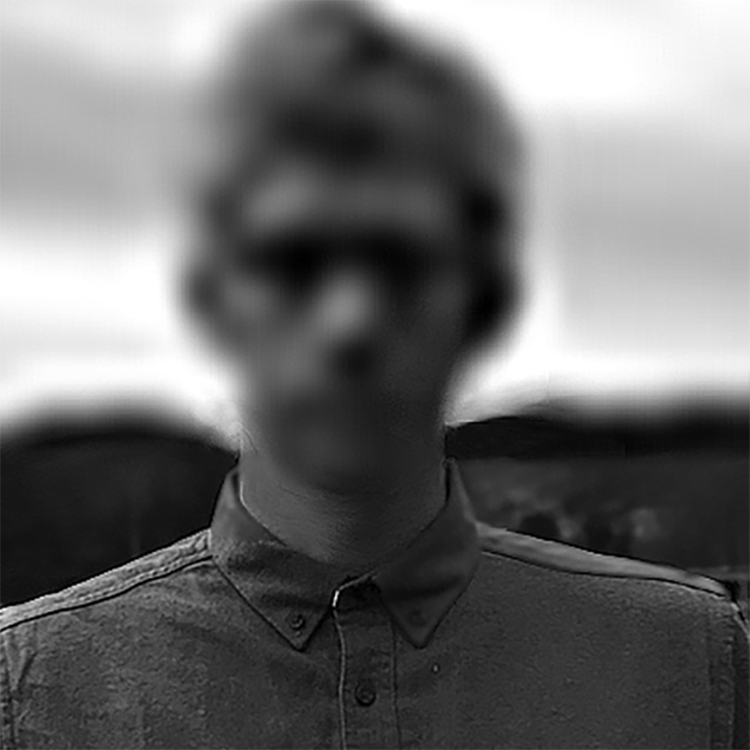 Daniel Howe (https://rednoise.org/daniel) is an artist and hacker whose work addresses the impact of networked, computational technologies on core human values such as diversity, privacy and freedom. He is a long-time open-source advocate and contributor to dozens of socially-engaged software projects. He divides his time between New York and Hong Kong where he teaches at the School of Creative Media.
Daniel Howe (https://rednoise.org/daniel) is an artist and hacker whose work addresses the impact of networked, computational technologies on core human values such as diversity, privacy and freedom. He is a long-time open-source advocate and contributor to dozens of socially-engaged software projects. He divides his time between New York and Hong Kong where he teaches at the School of Creative Media.
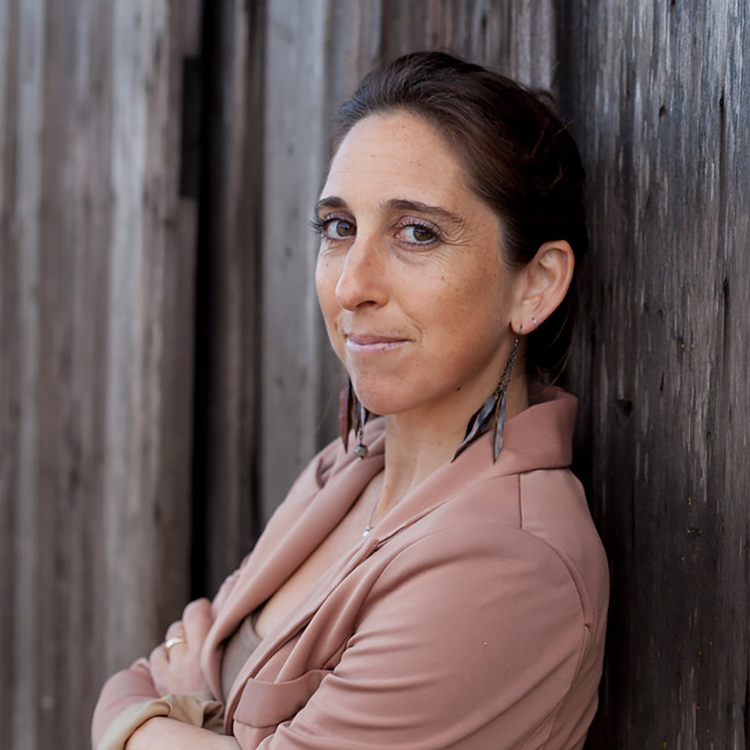 Stephanie Lepp is an independent artist whose work strives to hold up a mirror — inviting us to grow from what we see. She’s the producer and host of Reckonings (reckonings.show), a podcast exploring how we change our hearts and minds, and Infinite Lunchbox (bit.ly/influnch), a YouTube channel offering a fresh & heterodox take on current events. Stephanie is currently launching Deep Reckonings (deepreckonings.com), a synthetic media project exploring the question: how might we use our synthetic selves to elicit our better angels? The eponymous Infinite Lunchbox is her studio for socially-engaged art.
Stephanie Lepp is an independent artist whose work strives to hold up a mirror — inviting us to grow from what we see. She’s the producer and host of Reckonings (reckonings.show), a podcast exploring how we change our hearts and minds, and Infinite Lunchbox (bit.ly/influnch), a YouTube channel offering a fresh & heterodox take on current events. Stephanie is currently launching Deep Reckonings (deepreckonings.com), a synthetic media project exploring the question: how might we use our synthetic selves to elicit our better angels? The eponymous Infinite Lunchbox is her studio for socially-engaged art.
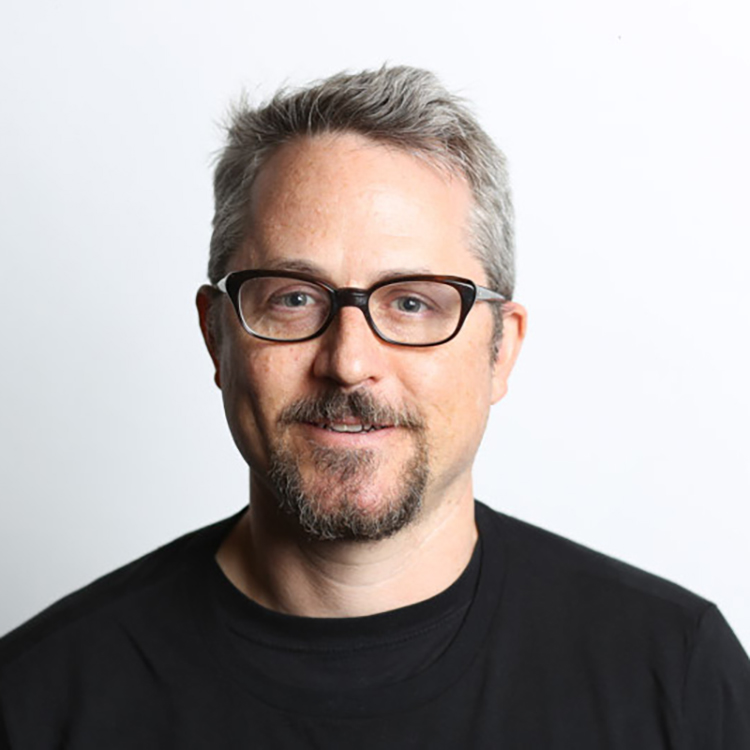 Sam Gregory is an award-winning technologist and advocate, and Program Director of WITNESS. An expert on new forms of misinformation and disinformation as well as innovations in preserving trust and authenticity he leads work on better preparedness for deepfakes (wit.to/Synthetic-Media-Deepfakes). He co-chairs the Partnership on AI’s Expert Group on AI and the Media, and is on the Technology Advisory Board of the International Criminal Court and on the US Board of First Draft. From 2010-2018 he taught the first graduate level course at Harvard on participatory media and human rights.
Sam Gregory is an award-winning technologist and advocate, and Program Director of WITNESS. An expert on new forms of misinformation and disinformation as well as innovations in preserving trust and authenticity he leads work on better preparedness for deepfakes (wit.to/Synthetic-Media-Deepfakes). He co-chairs the Partnership on AI’s Expert Group on AI and the Media, and is on the Technology Advisory Board of the International Criminal Court and on the US Board of First Draft. From 2010-2018 he taught the first graduate level course at Harvard on participatory media and human rights.
Not Funny Anymore: Deepfakes, manipulated media and mis/disinformation
Thursday, September 3rd, 9:00 PST, 12:00 EST, 16:00 UTC
Jane Lytvynenko (Buzzfeed News), Karen Hao (MIT Tech Review), Brandi Collins-Dexter (Color of Change) in conversation with Corin Faife (WITNESS)
 Jane Lytvynenko is an award-winning reporter at BuzzFeed News where she focuses on disinformation, cyber security, and online investigations. Jane has uncovered social media manipulation campaigns associated with state actors, financially-motivated bad actors spreading disinformation, and key data breaches. Her work also brings accessible fact-checking to wide audiences during times of crisis. Jane is from Kyiv, Ukraine and currently resides in Toronto, Canada.
Jane Lytvynenko is an award-winning reporter at BuzzFeed News where she focuses on disinformation, cyber security, and online investigations. Jane has uncovered social media manipulation campaigns associated with state actors, financially-motivated bad actors spreading disinformation, and key data breaches. Her work also brings accessible fact-checking to wide audiences during times of crisis. Jane is from Kyiv, Ukraine and currently resides in Toronto, Canada.
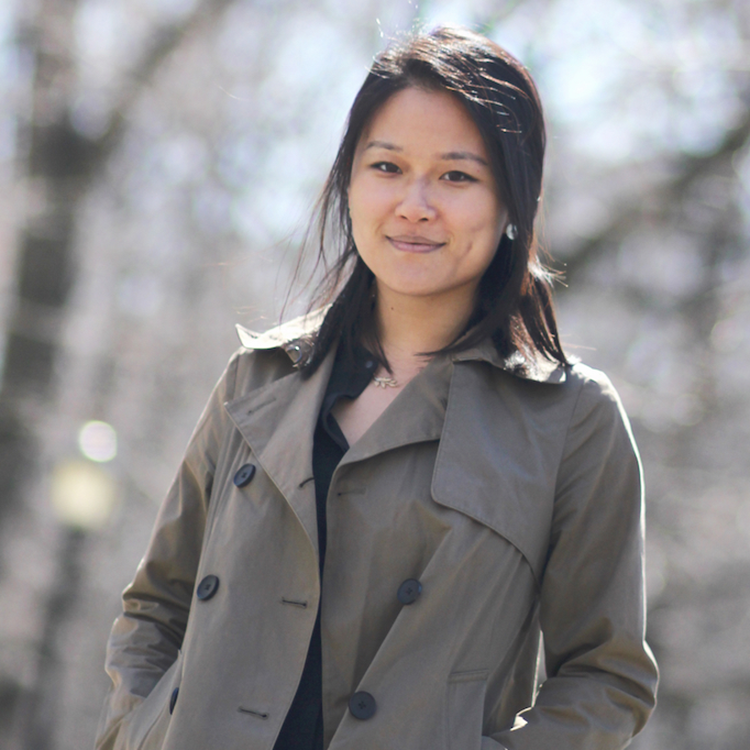 Karen Hao is the senior AI reporter at MIT Technology Review. She covers the cutting-edge research and social implications of the field, and writes a weekly newsletter that was nominated as one of the best on the internet by The Webby Awards. Previously, she worked as a data scientist at Quartz and as an application engineer at the first startup to spin out of Google[x]. She received her B.S. in mechanical engineering from MIT.
Karen Hao is the senior AI reporter at MIT Technology Review. She covers the cutting-edge research and social implications of the field, and writes a weekly newsletter that was nominated as one of the best on the internet by The Webby Awards. Previously, she worked as a data scientist at Quartz and as an application engineer at the first startup to spin out of Google[x]. She received her B.S. in mechanical engineering from MIT.
 Brandi Collins-Dexter is a visiting fellow at the Harvard Kennedy School’s Shorenstein Center on Media, Politics and Public Policy and a senior fellow at Color Of Change. She is currently writing a book about Black participation in democracy and the US economy, with particular focus on the role technology and information integrity play in improving or deteriorating community health.
Brandi Collins-Dexter is a visiting fellow at the Harvard Kennedy School’s Shorenstein Center on Media, Politics and Public Policy and a senior fellow at Color Of Change. She is currently writing a book about Black participation in democracy and the US economy, with particular focus on the role technology and information integrity play in improving or deteriorating community health.
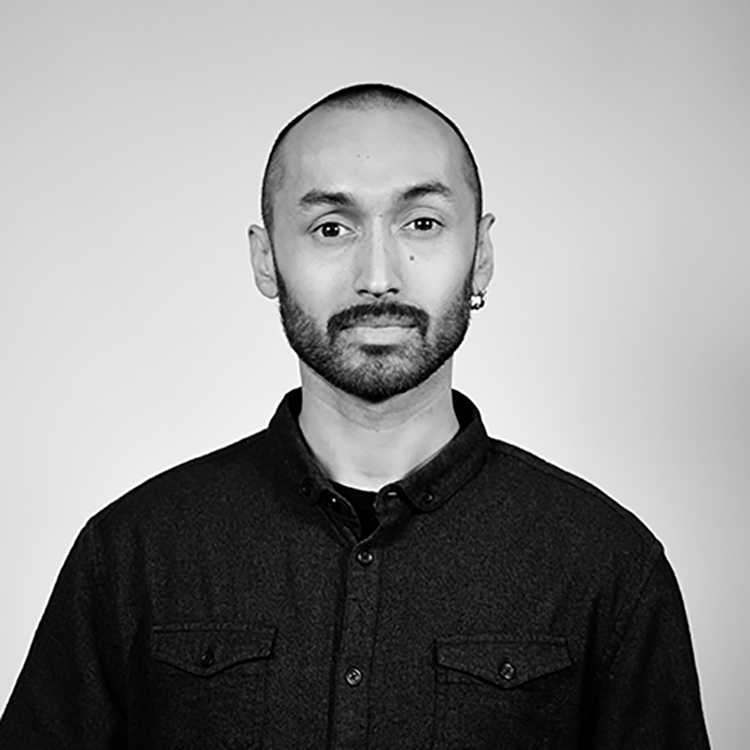 Corin Faife is a journalist and researcher working on WITNESS’ Emerging Threats and Opportunities program, currently focused on coordinating responses to deepfakes, synthetic media and disinformation that correspond with the needs of journalists and human rights defenders around the world. Before joining WITNESS Corin worked as a reporter covering technology news, specializing in stories on AI, hacking, autonomous vehicles, cryptocurrency and policing.
Corin Faife is a journalist and researcher working on WITNESS’ Emerging Threats and Opportunities program, currently focused on coordinating responses to deepfakes, synthetic media and disinformation that correspond with the needs of journalists and human rights defenders around the world. Before joining WITNESS Corin worked as a reporter covering technology news, specializing in stories on AI, hacking, autonomous vehicles, cryptocurrency and policing.
Using AI-generated Face Doubles in Documentary: Welcome to Chechnya
Tuesday, September 8th, 9:00 PST, 12:00 EST, 16:00 UTC (NOTE: different day of week and longer slot, as part of MIT Open Documentary Lab public lecture series)
For his new observational documentary, Welcome to Chechnya, director David France took extraordinary measures to protect his subjects: members of the LGBTQ+ community fleeing state-sanctioned persecution and violence in Chechnya. In a world-first, David turned to AI-generated face replacement tech (also used in deepfakes) to create a safe “witness protection program” for the subjects, while preserving an intensely emotional connection between the films’ audiences and subjects. To accomplish this feat, David added nearly a year to an elaborate post-production phase of the film. In this talk, David breaks down the complex technological, aesthetic, psychological and human rights protocols he and his team developed to create one of the most urgent and emotionally powerful documentaries of 2020.
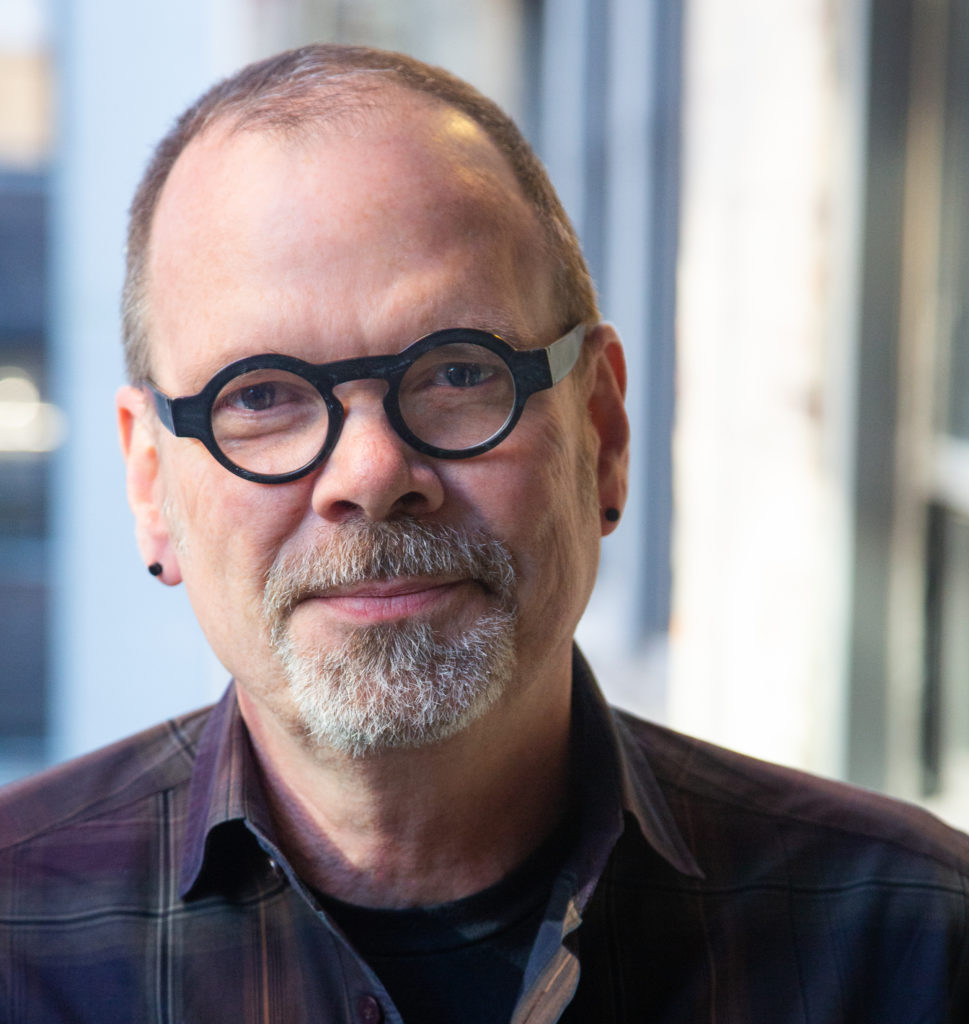 David France is is an Oscar-nominated filmmaker, New York Times bestselling author, and award-winning investigative journalist. His directorial debut, HOW TO SURVIVE A PLAGUE, is hailed as an innovative and influential piece of storytelling and is regularly screened in university classrooms, and by community groups and AIDS service organizations. Appearing on over 20 “Best of the Year” lists, including Time and Entertainment Weekly, the documentary earned a GLAAD Award and top honors from the Gotham Awards, the International Documentary Association, the New York Film Critics Circle, the Boston Society of Film Critics, and the Provincetown Film Festival, among many others. After a theatrical run reaching over 30 cities, HOW TO SURVIVE A PLAGUE was aired on PBS’ Independent Lens, reaching an audience of millions and garnering Academy and Emmy nominations and a Peabody Award. His 2017 film, THE DEATH & LIFE OF MARSHA P. JOHNSON, a Netflix Original Documentary, won numerous festival prizes and was awarded the Outfest “Freedom Award” and a special jury recognition from Sheffield International Documentary Festival. Critics put it on multiple “Best of the Year” lists (and gave it a 96% ranking on Rotten Tomatoes). David’s latest book, also titled HOW TO SURVIVE A PLAGUE (Knopf, 2016), received the Baillie Gifford Prize for best nonfiction book published in the English Language. In addition, France has seen his journalistic work inspire several films, including the Peabody-winning Showtime film SOLDIER’S GIRL, based on his New York Times Magazine story of the transgender girlfriend of a soldier killed in an anti-gay attack.
David France is is an Oscar-nominated filmmaker, New York Times bestselling author, and award-winning investigative journalist. His directorial debut, HOW TO SURVIVE A PLAGUE, is hailed as an innovative and influential piece of storytelling and is regularly screened in university classrooms, and by community groups and AIDS service organizations. Appearing on over 20 “Best of the Year” lists, including Time and Entertainment Weekly, the documentary earned a GLAAD Award and top honors from the Gotham Awards, the International Documentary Association, the New York Film Critics Circle, the Boston Society of Film Critics, and the Provincetown Film Festival, among many others. After a theatrical run reaching over 30 cities, HOW TO SURVIVE A PLAGUE was aired on PBS’ Independent Lens, reaching an audience of millions and garnering Academy and Emmy nominations and a Peabody Award. His 2017 film, THE DEATH & LIFE OF MARSHA P. JOHNSON, a Netflix Original Documentary, won numerous festival prizes and was awarded the Outfest “Freedom Award” and a special jury recognition from Sheffield International Documentary Festival. Critics put it on multiple “Best of the Year” lists (and gave it a 96% ranking on Rotten Tomatoes). David’s latest book, also titled HOW TO SURVIVE A PLAGUE (Knopf, 2016), received the Baillie Gifford Prize for best nonfiction book published in the English Language. In addition, France has seen his journalistic work inspire several films, including the Peabody-winning Showtime film SOLDIER’S GIRL, based on his New York Times Magazine story of the transgender girlfriend of a soldier killed in an anti-gay attack.
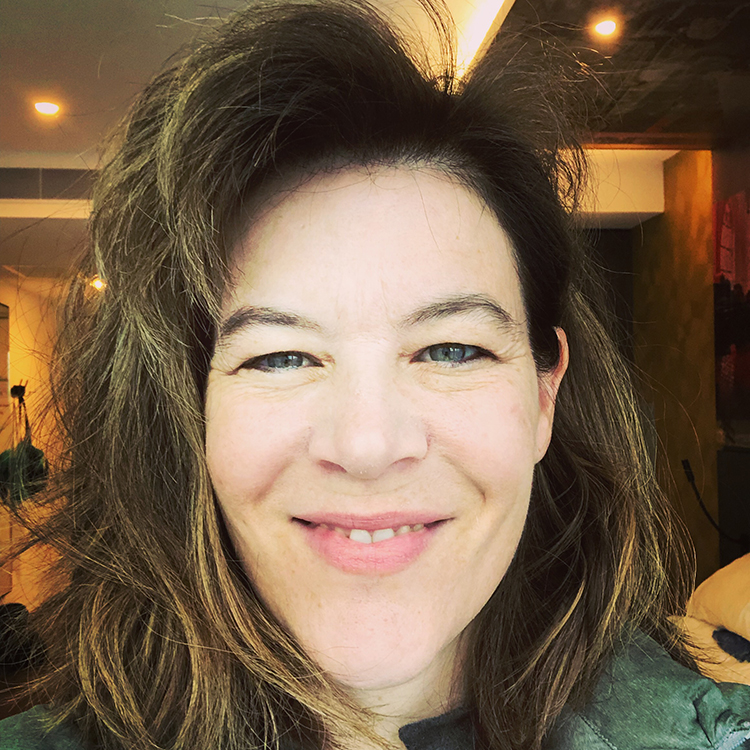 Katerina Cizek (she/her), is a two-time Emmy-winning documentarian working across emergent media. She is the artistic director and co-founder of the Co-Creation Studio at MIT Open Documentary Lab. Cizek recently wrote (with Prof. William Uricchio et al.) COLLECTIVE WISDOM a field study about co-creative practices in media. For over a decade at the National Film Board of Canada, Cizek was the creative force behind two award-winning and long-running documentary experiments, HIGHRISE and Filmmaker-in-Residence. Cizek’s earlier documentaries include the Hampton-Prize winner Seeing is Believing: Handicams, Human Rights and the News (2002) made in collaboration with witness.org.
Katerina Cizek (she/her), is a two-time Emmy-winning documentarian working across emergent media. She is the artistic director and co-founder of the Co-Creation Studio at MIT Open Documentary Lab. Cizek recently wrote (with Prof. William Uricchio et al.) COLLECTIVE WISDOM a field study about co-creative practices in media. For over a decade at the National Film Board of Canada, Cizek was the creative force behind two award-winning and long-running documentary experiments, HIGHRISE and Filmmaker-in-Residence. Cizek’s earlier documentaries include the Hampton-Prize winner Seeing is Believing: Handicams, Human Rights and the News (2002) made in collaboration with witness.org.
Boundary lines? Deepfakes weaponized against journalists and activists
Thursday, September 17th, 9:00 PST, 12:00 EST, 16:00 UTC
Samantha Cole (VICE) and Nina Schick in conversation with Assia Boundaoui
 Samantha Cole is is a Brooklyn-based journalist at Motherboard, Vice’s science and technology outlet. Sam covers the worlds of online sexuality, sex tech, and the adult industry, and was the first to uncover deepfakes in 2017, long before it became a global phenomenon.
Samantha Cole is is a Brooklyn-based journalist at Motherboard, Vice’s science and technology outlet. Sam covers the worlds of online sexuality, sex tech, and the adult industry, and was the first to uncover deepfakes in 2017, long before it became a global phenomenon.
 Nina Schick is a broadcaster and author specialising in how technology and Artificial Intelligence is reshaping politics. She has worked on the frontline of major political events over the last decade. This includes her work on Brexit; the EU’s migrant crisis; Emmanuel Macron’s Presidential campaign; election interference; disinformation and information warfare. Nina is the author of the recently published book, Deepfakes: The Coming Infocalypse
Nina Schick is a broadcaster and author specialising in how technology and Artificial Intelligence is reshaping politics. She has worked on the frontline of major political events over the last decade. This includes her work on Brexit; the EU’s migrant crisis; Emmanuel Macron’s Presidential campaign; election interference; disinformation and information warfare. Nina is the author of the recently published book, Deepfakes: The Coming Infocalypse
 Megha Rajagopalan is an international correspondent with BuzzFeed News covering technology and human rights. She has reported from 23 countries in Asia and the Middle East on stories ranging from the North Korean nuclear crisis to the peace process in Afghanistan. Much of her work has focused on the use of surveillance technology by authoritarian governments.
Megha Rajagopalan is an international correspondent with BuzzFeed News covering technology and human rights. She has reported from 23 countries in Asia and the Middle East on stories ranging from the North Korean nuclear crisis to the peace process in Afghanistan. Much of her work has focused on the use of surveillance technology by authoritarian governments.
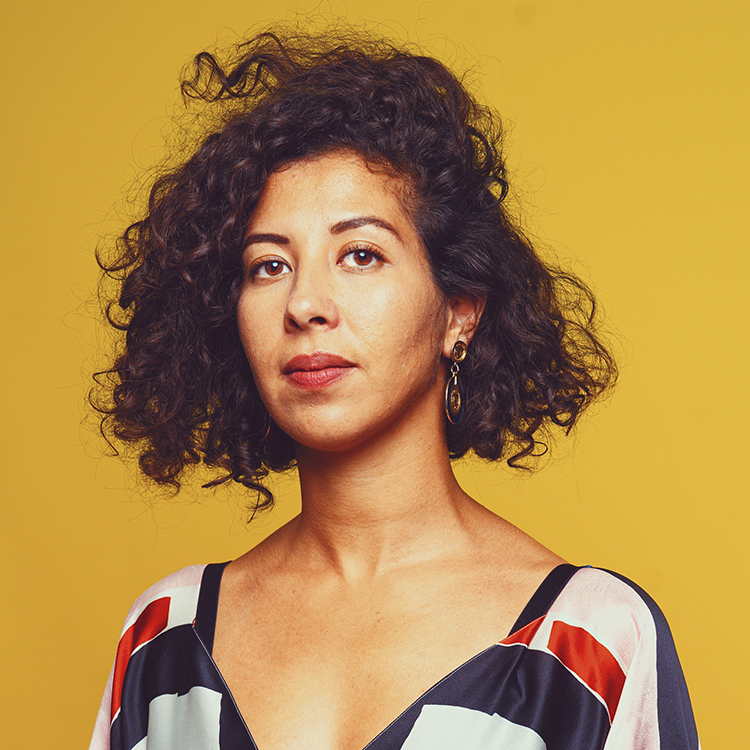 Assia Boundaoui is a 2020-2021 Ford Foundation JustFilms Fellow hosted at the Co-Creation Studio at the MIT Open Documentary Lab. She is an Algerian-American filmmaker and investigative journalist who has reported internationally for NPR, BBC, AlJazeera, VICE and CNN among others. Her debut short film about hijabi hair salons for HBO Documentary Films premiered at the 2018 Sundance Film Festival. Her award-winning feature-length directorial debut, THE FEELING OF BEING WATCHED a documentary investigating a decade of FBI surveillance in Assia’s Muslim-American community, had its world premiere at the 2018 Tribeca Film Festival and national broadcast on PBS “POV”. Assia was named one of Filmmaker Magazine’s 2018 “25 New Faces of Independent Film,” was a 2019 New America National Fellow and in 2020 was honored to win the Livingston Award for national reporting. She has an M.A. in journalism from New York University and is an Algiers born, Arabic speaking, Chicago-native, currently based in southern California. While at the Co-Creation Studio, Assia is iterating her most recent hybrid work, a community co-created, AI-fueled sequel to her film: the Inverse Surveillance Project.
Assia Boundaoui is a 2020-2021 Ford Foundation JustFilms Fellow hosted at the Co-Creation Studio at the MIT Open Documentary Lab. She is an Algerian-American filmmaker and investigative journalist who has reported internationally for NPR, BBC, AlJazeera, VICE and CNN among others. Her debut short film about hijabi hair salons for HBO Documentary Films premiered at the 2018 Sundance Film Festival. Her award-winning feature-length directorial debut, THE FEELING OF BEING WATCHED a documentary investigating a decade of FBI surveillance in Assia’s Muslim-American community, had its world premiere at the 2018 Tribeca Film Festival and national broadcast on PBS “POV”. Assia was named one of Filmmaker Magazine’s 2018 “25 New Faces of Independent Film,” was a 2019 New America National Fellow and in 2020 was honored to win the Livingston Award for national reporting. She has an M.A. in journalism from New York University and is an Algiers born, Arabic speaking, Chicago-native, currently based in southern California. While at the Co-Creation Studio, Assia is iterating her most recent hybrid work, a community co-created, AI-fueled sequel to her film: the Inverse Surveillance Project.
Manipulating memories: Archives, history and deepfakes
Thursday, September 24th, 9:00 PST, 12:00 EST, 16:00 UTC
Francesca Panetta and Halsey Burgund (In Event of Moon Disaster), James Coupe (Thoughtworks Synthetic Media Resident 2020) and Yvonne Ng (WITNESS)
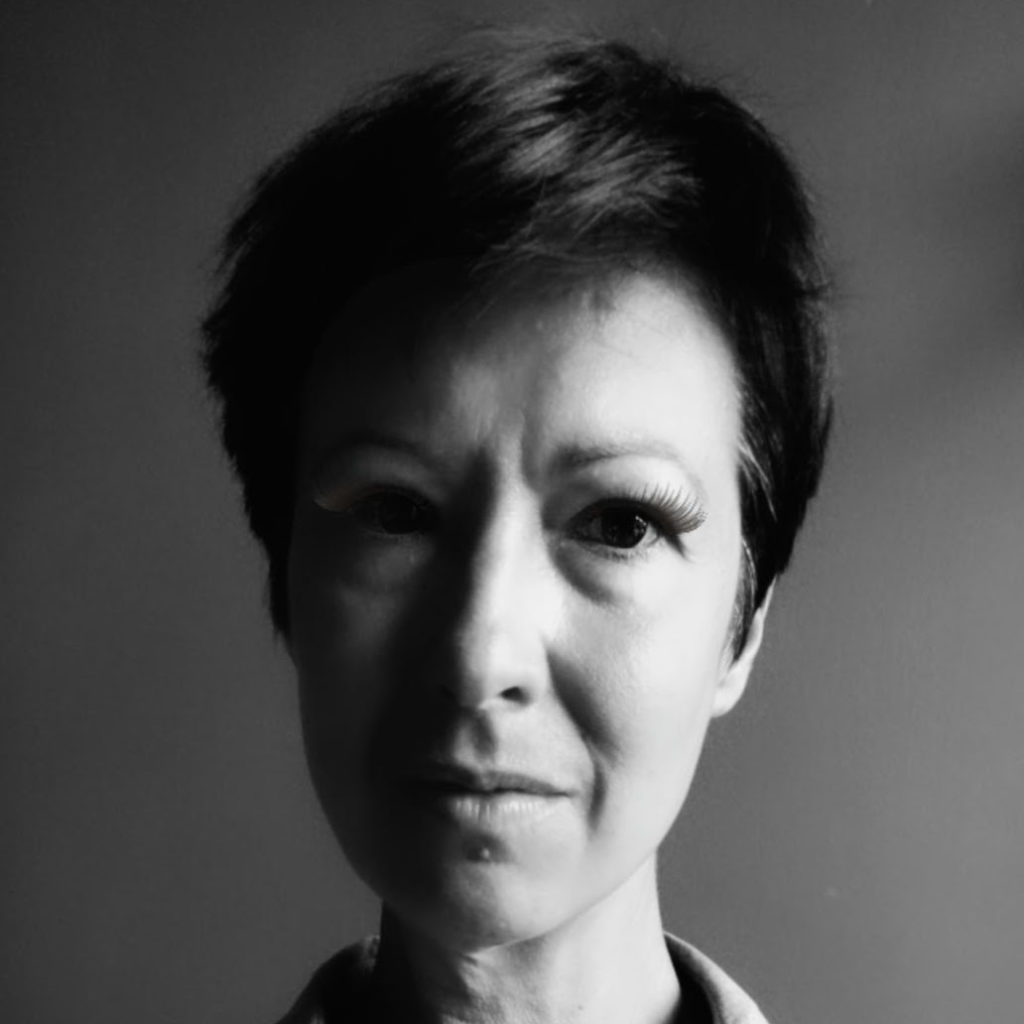 Francesca Panetta is an immersive artist, director and journalist. She uses emerging technologies to innovate new forms of storytelling that have social impact. She currently works as Creative Director in the MIT Center for Advanced Virtuality. Previous to MIT, she worked at the Guardian for over a decade where she pioneered new forms of journalism including interactive features, location-based augmented reality, and virtual reality leading the Guardian’s inhouse VR studio. Her works have won critical acclaim – receiving awards around the world, and touring the White House, Tribeca, Cannes, Sundance, and more. She was a 2019 Nieman Fellow at Harvard University.
Francesca Panetta is an immersive artist, director and journalist. She uses emerging technologies to innovate new forms of storytelling that have social impact. She currently works as Creative Director in the MIT Center for Advanced Virtuality. Previous to MIT, she worked at the Guardian for over a decade where she pioneered new forms of journalism including interactive features, location-based augmented reality, and virtual reality leading the Guardian’s inhouse VR studio. Her works have won critical acclaim – receiving awards around the world, and touring the White House, Tribeca, Cannes, Sundance, and more. She was a 2019 Nieman Fellow at Harvard University.
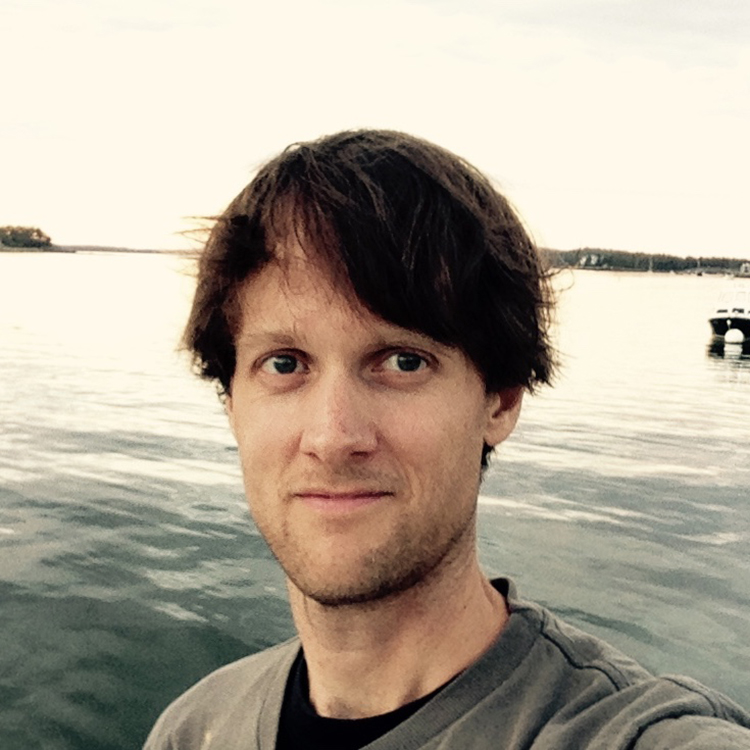 Halsey Burgund is a sound artist and technologist whose work focuses on the combination of modern technologies – from mobile phones to artificial intelligence – with fundamentally human “technologies”, primarily language, music and the spoken voice. He is the creator of Roundware, the open source contributory audio AR platform, which has been used to create art and educational installations for cultural organizations internationally. Halsey was a Smithsonian Artist Research Fellow, a Research Affiliate at the MIT Media Lab and is currently a fellow at the MIT Open Documentary Lab.
Halsey Burgund is a sound artist and technologist whose work focuses on the combination of modern technologies – from mobile phones to artificial intelligence – with fundamentally human “technologies”, primarily language, music and the spoken voice. He is the creator of Roundware, the open source contributory audio AR platform, which has been used to create art and educational installations for cultural organizations internationally. Halsey was a Smithsonian Artist Research Fellow, a Research Affiliate at the MIT Media Lab and is currently a fellow at the MIT Open Documentary Lab.
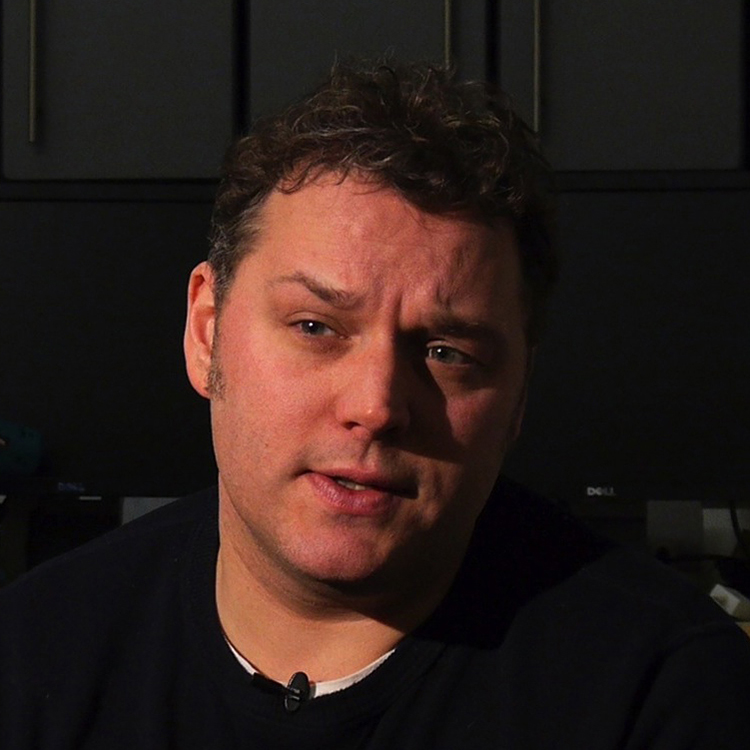 James Coupe is a Seattle-based artist who works with video, installation, internet, and emerging media forms. His work includes real-time public surveillance systems, interactive deepfake installations, and collaborations with Amazon Mechanical Turk micro-laborers. Reflecting on the impact of Big Data, immaterial labor and AI, Coupe’s art works explore searches, queries, automation, classification systems, and algorithmic narratives. He has been on the faculty at the Center for Digital Art and Experimental Media (DXARTS) at the University of Washington since 2004, where he teaches classes in Video, Internet and Data-Driven Art. His work can be found at jamescoupe.com.
James Coupe is a Seattle-based artist who works with video, installation, internet, and emerging media forms. His work includes real-time public surveillance systems, interactive deepfake installations, and collaborations with Amazon Mechanical Turk micro-laborers. Reflecting on the impact of Big Data, immaterial labor and AI, Coupe’s art works explore searches, queries, automation, classification systems, and algorithmic narratives. He has been on the faculty at the Center for Digital Art and Experimental Media (DXARTS) at the University of Washington since 2004, where he teaches classes in Video, Internet and Data-Driven Art. His work can be found at jamescoupe.com.
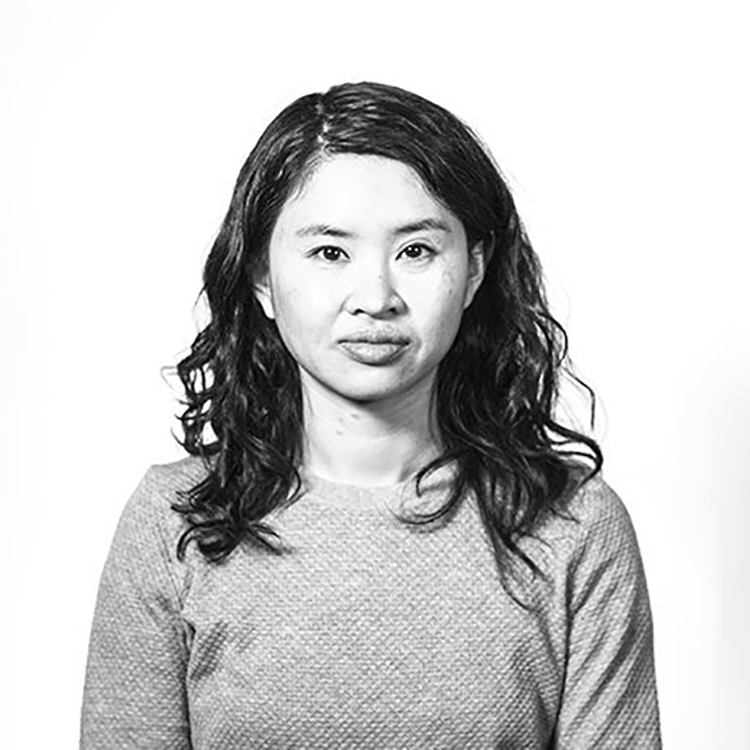 Yvonne Ng is an audiovisual archivist and has been part of the WITNESS team since 2009. In collaboration with WITNESS regional leads, she trains and supports partners on collecting, managing, and preserving video documentation for human rights advocacy and evidence. She develops training resources related to archiving and preservation, such as the groundbreaking Activists’ Guide to Archiving Video. Yvonne also manages WITNESS’s own archive of human rights video. Outside of WITNESS, Yvonne serves on the Board of Directors for the Association of Moving Image Archivists (AMIA), on the Advisory Boards of the Memory Lab Network and Documenting the Now.
Yvonne Ng is an audiovisual archivist and has been part of the WITNESS team since 2009. In collaboration with WITNESS regional leads, she trains and supports partners on collecting, managing, and preserving video documentation for human rights advocacy and evidence. She develops training resources related to archiving and preservation, such as the groundbreaking Activists’ Guide to Archiving Video. Yvonne also manages WITNESS’s own archive of human rights video. Outside of WITNESS, Yvonne serves on the Board of Directors for the Association of Moving Image Archivists (AMIA), on the Advisory Boards of the Memory Lab Network and Documenting the Now.
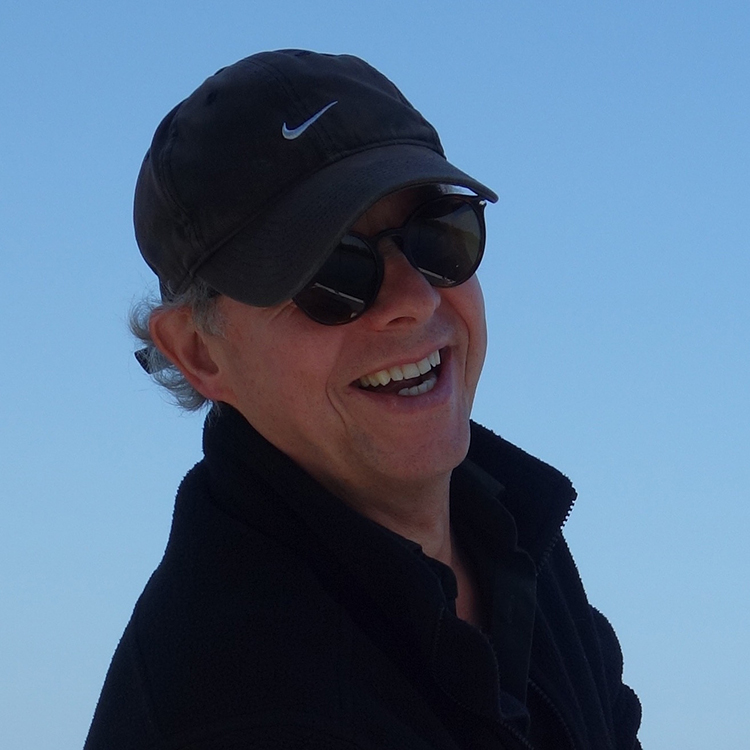 William Uricchio is a media historian. He explores how cultures understand reality, how they represent it, and how those representations are deployed; he has a particular interest in emerging media systems. Professor of Comparative Media Studies at MIT and founder and Principal Investigator of the MIT Open Documentary Lab and Principal Investigator of the Co-Creation Studio, William received Guggenheim, Humboldt, and Fulbright awards, and has held professorships in the Netherlands, Sweden, Germany, Denmark, and China. His most recent book, co-authored with Katerina Cizek, is Collective Wisdom: Co-Creating Media Within Communities, Across Disciplines, and With Algorithms.
William Uricchio is a media historian. He explores how cultures understand reality, how they represent it, and how those representations are deployed; he has a particular interest in emerging media systems. Professor of Comparative Media Studies at MIT and founder and Principal Investigator of the MIT Open Documentary Lab and Principal Investigator of the Co-Creation Studio, William received Guggenheim, Humboldt, and Fulbright awards, and has held professorships in the Netherlands, Sweden, Germany, Denmark, and China. His most recent book, co-authored with Katerina Cizek, is Collective Wisdom: Co-Creating Media Within Communities, Across Disciplines, and With Algorithms.
Still funny? Satire, deepfakes and human rights globally
Thursday, October 1st, 9:00 PST, 12:00 EST, 16:00 UTC
Julie Owono (Internet Sans Frontieres) and Evelyn Aswad (University of Oklahoma) in conversation with Sam Gregory (WITNESS)
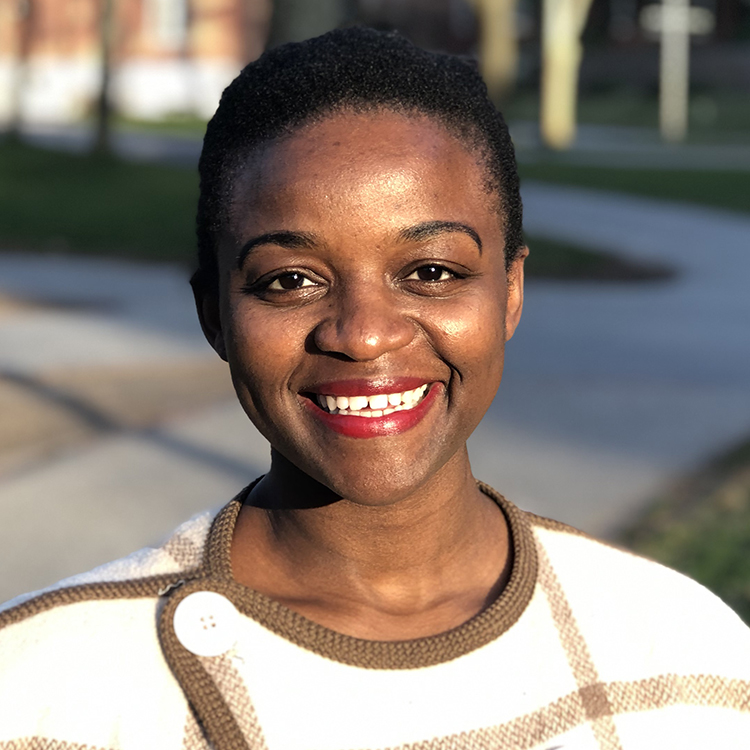 Julie Owono is the Executive Director of Internet Without Borders, an advocacy and research organization working to protect online Freedom of expression and privacy, and access to internet for all. She is also a Fellow at the Digital Civil Society Lab at Stanford University, where she is developing solutions to moderate hate and disinformation on social media platforms, in a way that preserves freedom of expression. Julie is a member of the recently created Facebook Oversight Board, a member of UNESCO Ad Hoc Expert Group on the Ethics of Artificial Intelligence, and a member of the World Benchmarking Alliance’s Expert Committee on Digital Inclusion.
Julie Owono is the Executive Director of Internet Without Borders, an advocacy and research organization working to protect online Freedom of expression and privacy, and access to internet for all. She is also a Fellow at the Digital Civil Society Lab at Stanford University, where she is developing solutions to moderate hate and disinformation on social media platforms, in a way that preserves freedom of expression. Julie is a member of the recently created Facebook Oversight Board, a member of UNESCO Ad Hoc Expert Group on the Ethics of Artificial Intelligence, and a member of the World Benchmarking Alliance’s Expert Committee on Digital Inclusion.
Evelyn Aswad
 Sam Gregory is an award-winning technologist and advocate, and Program Director of WITNESS. An expert on new forms of misinformation and disinformation as well as innovations in preserving trust and authenticity he leads work on better preparedness for deepfakes (wit.to/Synthetic-Media-Deepfakes). He co-chairs the Partnership on AI’s Expert Group on AI and the Media, and is on the Technology Advisory Board of the International Criminal Court and on the US Board of First Draft. From 2010-2018 he taught the first graduate level course at Harvard on participatory media and human rights.
Sam Gregory is an award-winning technologist and advocate, and Program Director of WITNESS. An expert on new forms of misinformation and disinformation as well as innovations in preserving trust and authenticity he leads work on better preparedness for deepfakes (wit.to/Synthetic-Media-Deepfakes). He co-chairs the Partnership on AI’s Expert Group on AI and the Media, and is on the Technology Advisory Board of the International Criminal Court and on the US Board of First Draft. From 2010-2018 he taught the first graduate level course at Harvard on participatory media and human rights.
Just added: Still funny? Political satire in Brazil with Bruno Sartori
Thursday, October 8th, 9:00 PST, 12:00 EST, 16:00 UTC
Bruno Sartori (Brazilian political and popular deepfake satirist) in conversation with TBC
